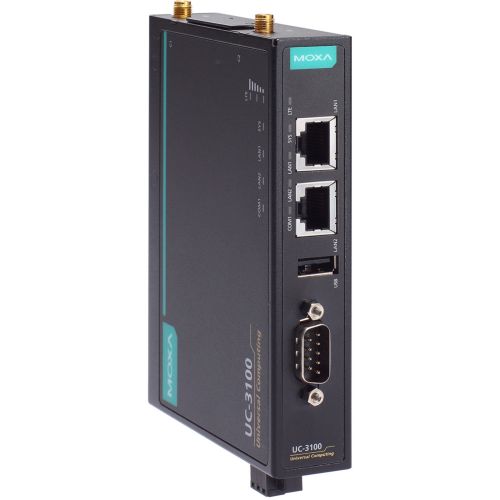
UC-3101-T-EU-LX
RISC-based LTE cat.1 computer for EU, 1 GHz CPU, 512MB RAM, 4GB eMMC, 2 Ethernet, 1 serial port, 1 USB port and -30 to 70°C operating temperature
Certificati



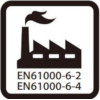
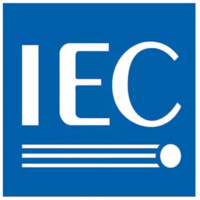
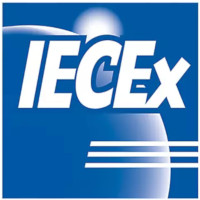
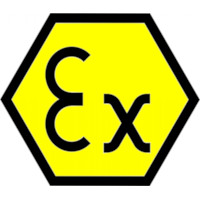

Features and Benefits
• Armv7 Cortex-A8 1000 MHz processor
• Integrated Wi-Fi 802.11a/b/g/n and LTE Cat.1 for the US, EU, and
AUS regions
• Supports TPM v2.0 (optional)
• Industrial CAN 2.0 A/B protocol supported
• -30 to 70°C system operating temperature
• Meets the EN 61000-6-2 and EN 61000-6-4 standards for
industrial EMC applications
• Ready-to-run Debian 9 with 10-year long-term support
• Supports Linux real-time OS mode
• Robust Root File System to prevent the system from being
bricked due to a firmware update failure
Introduction
Moxa’s UC-3100 Series computers can be used as edge-field smart
gateways for data pre-processing and transmission, as well as for
other embedded data acquisition applications. The UC-3100 Series
includes three models, each supporting different wireless options and
protocols.
The UC-3100’s advanced heat dissipation design makes it suitable
for use in temperatures ranging from -40 to 70°C. In fact, the Wi-Fi
and LTE connections can be used simultaneously in both cold and hot
environments, allowing you to maximize your “data pre-processing”
and “data transmission” capability in most harsh environments.
In addition, TPM v2.0 uses a hardware chip to boost data security,
making it highly unlikely that hackers will be able to steal your data,
either remotely or locally.
The UC-3100 is more than just a hardware solution. In order to offer a
better user experience with a Moxa Arm-based computer, the UC-3100
supports the following software features, allowing you to use the most
suitable configuration based on your particular application.
• High VPN performance; greater than 70 Mbps Ethernet throughput
with AES 256 encryption
• Robust file system to prevent the system from being bricked due
to a firmware upgrade interruption
• Cybersecurity auto-config system compliant with IEC 62443 lv.2
• Real COM mode to provide a control interface with Moxa’s NPort
products
In addition, Moxa provides 10 years of Linux OS support from Moxa’s
customer support engineers. With a new version of the Debian
repository released on average every 2 to 3 years, long-term Linux OS
support helps you create a reliable solution that will be supported now
and long into the future.
Applications
• Remote Terminal Unit (RTU)
• Data acquisition
• M2M communication (smart gateway)
• Digital signage
• Factory automation
• In-vehicle monitor/data logger (transportation)
• Programmable router
• Energy usage optimization
• Predictive maintenance
• Asset management
Hardware SpecificationsComputer
CPU: Armv7 Cortex-A8 1000 MHz
OS (preinstalled): Debian 9 (Kernel 4.4)
Main Storage: 4 GB eMMC with OS preinstalled
Expansion Storage (UC-3111 only): 1 SDHC/SDXC socket
DRAM: 512 MB DDR3 SDRAM
USB: 1 USB 2.0 host (type A connector)
Storage
Main Storage: 4 GB eMMC with OS preinstalled
Expansion Storage (UC-3111 only): 1 SDHC/SDXC socket
Other Peripherals
TPM: v2.0 reserved (SPI interface)
SIM: 2 nano SIM slots
Ethernet Interface
LAN: 2 auto-sensing 10/100 Mbps ports (RJ45)
Magnetic Isolation Protection: 1.5 kV built-in
Cellular Interface
Standard: LTE (FDD) 3GPP Rel.9 compliant
Regional Variants:
• US Model:
LTE Bands: 2, 4, 5, 12 (700, 850, 1700/2100 (AWS) and 1900 MHz)
UMTS Bands: 5, 4, 2 (WCDMA/FDD 850, 1700/2100 (AWS) and 1900
MHz)
Carrier Approval: AT&T
• VZW Model (Pending because the Verizon certification is in
progress):
LTE Bands: 4,13 (1700/2100 AWS, 700 MHz)
Carrier Approval: Verizon
• EU Model:
LTE Bands: 1, 3, 8, 20, 28* (700*, 800, 900, 1800, 2100 MHz)
GSM Bands: 900 and 1800 MHz
• AU/NZS Model:
LTE Bands 3, 5, 8, 28 (1800, 850, 900, 700 MHz)
UMTS Bands 1, 5, 8 (WCDMA/FDD 2100, 850, 900 MHz)
Carrier Approval: Telstra, Optus
WLAN Interface (UC-3111/3121 only)
Standards:
• IEEE 802.11a/b/g/n for Wireless LAN
• IEEE 802.11i for Wireless Security
Supported Bands: 2.4 GHz and 5 GHz
Serial Interface
Standards: 1 or 2 RS-232/422/485 ports, software-selectable
Connector Type: DB9 male
Serial Communication Parameters
Data Bits: 5, 6, 7, 8
Stop Bits: 1, 1.5, 2
Parity: None, Even, Odd, Space, Mark
Flow Control: XON/XOFF, ADDC® (automatic data direction control)
for RS-485
Baudrate: 921600 bps (max.)
Serial Signals
RS-232: TxD, RxD, RTS, CTS, GND
RS-422: TxD+, TxD-, RxD+, RxD-, GND
RS-485-4w: TxD+, TxD-, RxD+, RxD-, GND
RS-485-2w: Data+, Data-, GND
CAN Interface
Standards: 1 CAN port, CAN2.0A/2.0B compliant
Signals: CAN_H, CAN_L, CAN_GND, CAN_SHLD, CAN_V+, GND
Isolation: 2 kV digital isolation
Speed: 10 kbps to 1 Mbps
Connector Type: DB9 male
Console Interface
Standards: 1 RS-232 port
Signals: TxD, RxD, GND
Connector Type: 4-pin header output (115200, n, 8, 1)
Switches and Buttons
Push Button: Initially configured to return a diagnostic report, and to
reset the device to factory defaults
Physical Characteristics
Housing: Al 5052
Weight: 550 g (1.22 lb)
Dimensions:
UC-3101: 128.5 x 89.1 x 26 mm (5.06 x 3.51 x 1.02 in)
UC-3111, UC-3121: 128.5 x 89.1 x 41 mm (5.06 x 3.51 x 1.61 in)
Mounting: Wall, DIN rail
Environmental Limits
Operating Temperature: -30 to 70°C (-22 to 158°F)
Storage Temperature: -40 to 85°C (-40 to 185°F)
Ambient Relative Humidity: 5 to 95% (non-condensing)
Anti-Vibration: 2 Grms @ IEC 60068-2-64, random wave, 5-500 Hz, 1
hr per axis (without any USB devices attached)
Anti-Shock: 20 g @ IEC 60068-2-27, half sine wave, 30 ms
Power Requirements
Input Voltage: 9 to 36 VDC (3-pin terminal block, V+, V-, SG)
Input Current: 500 mA @ 12 VDC
Power Consumption: 6 W (with cellular module active)
Standards and Certifications
Safety: UL 60950-1
Hazardous Environments*: C1D2, IECEx, ATEX
*Certification process is underway
EMC: IEC 61000-6-2/6-4
EMI: CISPR 32, FCC Part 15B Class A
EMS:
IEC 61000-4-2 ESD: Contact: 4 kV; Air: 8 kV
IEC 61000-4-3 RS: 80 MHz to 1 GHz, 10 V/m
IEC 61000-4-4 EFT: Power: 2 kV; Signal: 1 kV
IEC 61000-4-5 Surge: DC Power: 0.5 kV; Signal: 1 kV
IEC 61000-4-6 CS: 10 V
IEC 61000-4-8 PFMF: 30 A/m
Green Product: RoHS, CRoHS, WEEE
Cellular: CE: EN 301511 (2G), EN 301908-1 (4G), MPE SAR, EN
301489-1-1 (2G), EN 301489-24 (4G), FCC, PTCRB, AS/NZS S042, AS/
NZS 60950
Wi-Fi: EN 301489-1-17 (EMC), EN 300328 (2.4G), EN 301893 (5G)
Reliability
Alert Tools: External RTC (real-time clock)
Automatic Reboot Trigger: External WDT (watchdog timer)
Warranty
Warranty Period: 5 years
Software SpecificationsLinux
OS: Debian 9 (Kernel 4.4)
Web Server (Apache): Supports PHP and XML
Terminal Server (SSH): Provides secure encrypted communications
between two untrusted hosts over an unsecure network
Kernel: GNU/Linux 4.4
System Shell: DASH (default), BASH
Text Editor: vim, nano
Internet Protocol Suite: TCP, UDP, IPv4, IPv6, SNMPv2, ICMP, ARP,
HTTP, CHAP, PAP, DHCP, NTP, NFS, SSH, PPP, SFTP, RSYNC, SSL
Programming Language Support: PHP, Perl, Python
Internet Security Suite: OpenVPN, iptables
Cryptographic Hardware Accelerators: AES, SHA, OpenSSL
Linux Board Support Packages (BSP):
• GCC C/C++ cross development tool chain
• Bootloader/ Kernel/ filesystem
Cellular Networking:
• WVDIAL: Point-to-Point Protocol dialer that dials a modem and starts
pppd to connect to the Internet.
• MODBUS: Software library to send/receive data according to the
Modbus protocol. This library is written in C and supports RTU (serial)
and TCP (Ethernet) communications.
• Watchdog: Features a hardware function to trigger system reset in a
user-specified time interval (Linux standard API).
Cybersecurity:
• Security Update of Existing Software Packages: All software packages
installed on the UC-3100 Series can be updated either from Debian
Linux’s APT server or Moxa’s APT server.
• USB Protection: Provides a mechanism for disabling USB function to
avoid USB stick malware attacks.
• SD Write Protection: Provides a mechanism for disabling write
permission to the Micro SD memory card plugged in directly into the
card slot, or which is part of an extended storage system.

